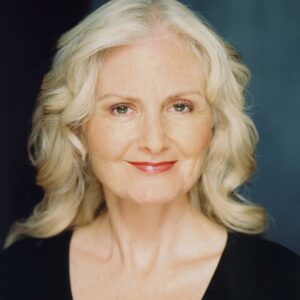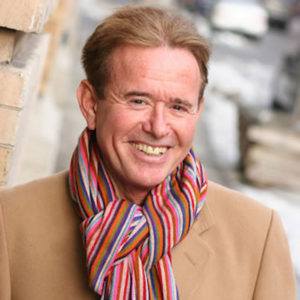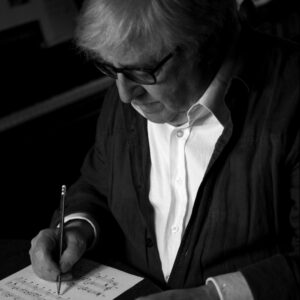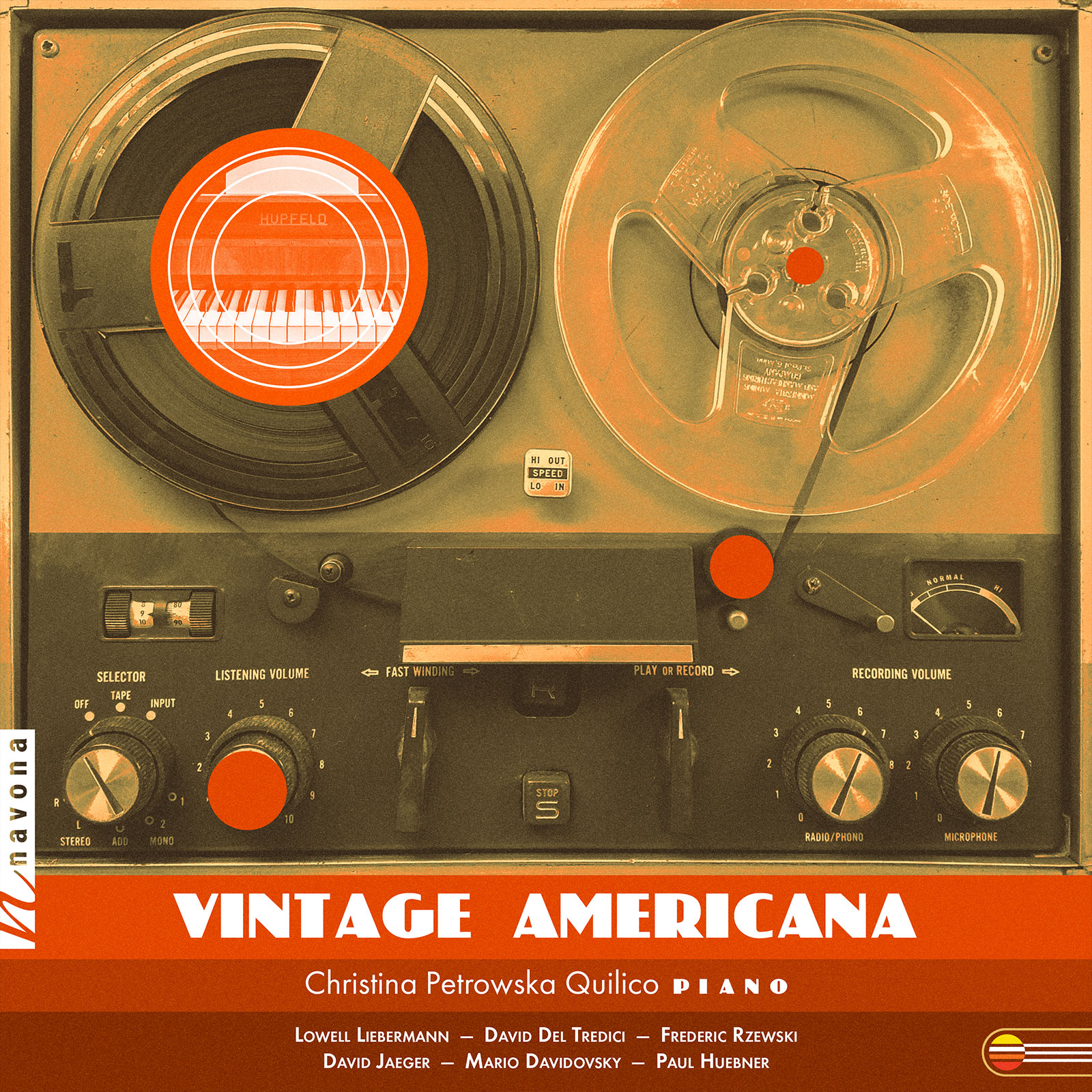Vintage Americana
Christina Petrowska Quilico piano
Lowell Liebermann composer
David Del Tredici composer
Frederic Rzewski composer
David Jaeger composer
Mario Davidovsky composer
Paul Huebner composer
Hailed by the New York Times as a “promethean talent,” Canadian pianist Christina Petrowska Quilico performs compositions from six American composers on VINTAGE AMERICANA. In an exhilarating show of virtuosity, Petrowska Quilico steps unflinchingly from tonality to atonality and back again. While the solo piano is the unquestioned star of the album, moments of electronic manipulation and other unexpected instrumentation offer surprising new textures. In VINTAGE AMERICANA, Christina Petrowska Quilico reimagines what this centuries-old instrument is capable of. The result is a captivating collection of masterfully-performed works from some of America’s most gifted composers.
Listen
Stream/Buy
Choose your platform
"Challenging repertoire, well worth investigating."
Track Listing & Credits
| # | Title | Composer | Performer | |
|---|---|---|---|---|
| 01 | Apparitions: Inquieto, teneramente e fragile; un poco delirando | Lowell Liebermann | Christina Petrowska Quilico, piano | 1:54 |
| 02 | Apparitions: Nobile | Lowell Liebermann | Christina Petrowska Quilico, piano | 3:12 |
| 03 | Apparitions: Affrettando misterioso | Lowell Liebermann | Christina Petrowska Quilico, piano | 2:41 |
| 04 | Apparitions: Supplichevole | Lowell Liebermann | Christina Petrowska Quilico, piano | 3:15 |
| 05 | Fantasy Pieces: Adagio, espressivo | David Del Tredici | Christina Petrowska Quilico, piano | 1:52 |
| 06 | Fantasy Pieces: Poco Allegretto | David Del Tredici | Christina Petrowska Quilico, piano | 1:18 |
| 07 | Fantasy Pieces: Allegro Minacciando | David Del Tredici | Christina Petrowska Quilico, piano | 1:31 |
| 08 | Fantasy Pieces: Largo, senza tempo | David Del Tredici | Christina Petrowska Quilico, piano | 4:06 |
| 09 | The Turtle and the Crane | Frederic Rzewski | Christina Petrowska Quilico, piano | 16:47 |
| 10 | Quivi Sospiri | David Jaeger | Christina Petrowska Quilico, piano | 10:15 |
| 11 | Synchronisms | Mario Davidovsky | Christina Petrowska Quilico, piano | 7:02 |
| 12 | Ocotillo | Paul Huebner | Christina Petrowska Quilico, piano | 15:28 |
TRACKS 1-8
Recorded live at a concert at the Glenn Gould Studio in Toronto ON, Canada
Recording Session Producer David Jaeger
Recording Session Engineer David Quinney
TRACK 9
Recorded at Humbercrest United Church in York ON, Canada
Recording Session Producer and Engineer Anton Kwiatkowski
TRACK 10
Recorded at Humbercrest United Church in York ON, Canada
Recording Session Producer David Jaeger
Recording Session Engineer David Quinney
TRACKS 11-12
Recorded at Walter Hall, University of Toronto in Toronto ON, Canada
Recording Session Producer Richard Coulter
Recording Session Engineer James Reid
Music compiling and editing David Jaeger
Publicist, program notes editor Linda Litwack
Executive Producer Bob Lord
Executive A&R Sam Renshaw
A&R Director Brandon MacNeil
General Manager of Audio & Sessions Jan Košulič
Audio Director, Addtl. Mastering Lucas Paquette
VP, Design & Marketing Brett Picknell
Art Director Ryan Harrison
Design Edward A. Fleming
Publicity Patrick Niland, Sara Warner
Artist Information

Christina Petrowska Quilico
“An extraordinary talent with phenomenal ability” and “dazzling virtuosity” (The New York Times), Christina Petrowska Quilico has won fans internationally for her 60 albums, solo recitals and performances of 53 piano concertos. Reviews describe her as a “piano wizard” (Take Effect Reviews), “the towering Canadian piano virtuoso” (The WholeNote), “commanding pianism” (American Record Guide), “intelligent program” (Gramophone), and her “ability to leave a permanent impression on the listener’s soul” (Sonograma Magazine). One of “Canada’s 25 best classical pianists” and in the “Concert Hall of Fame” (Canadian Broadcasting Corporation), she was appointed to the Order of Canada, Order of Ontario and the Royal Society of Canada.

David Del Tredici
Generally recognized as the father of the Neo-Romantic movement in music, David Del Tredici has received numerous awards (including the Pulitzer Prize) and has been commissioned and performed by nearly every major American and European orchestral ensemble. "Del Tredici," said Aaron Copland, "is that rare find among composers ó a creator with a truly original gift. I venture to say that his music is certain to make a lasting impression on the American musical scene. I know of no other composer of his generation who composes music of greater freshness and daring, or with more personality."

David Jaeger
David Jaeger is a music producer, composer, and broadcaster. Jaeger's compositions range from chamber music to vocal and choral works and opera, as well as orchestral and electronic music. His works for the piano form a large portion of his canon, most of it added since his retirement from CBC in 2013. Since that date, Jaeger has concentrated increasingly on compositions for solo instruments and voices, often based on literary texts. His Nocturnes, written between 2020 and 2023, are all based on poetry he compiled from several authors who he has collaborated with: David Cameron, Seán Haldane, Bruce Whiteman, and his pianist collaborator, Christina Petrowska Quilico.
Lowell Liebermann
Praised as “radiantly visionary…a composer unafraid of grand gestures and openhearted lyricism” (TIME), Lowell Liebermann is one of America’s most frequently performed and recorded living composers. Some of his nearly 140 compositions in all genres have become standard repertoire—notably, his Sonata for Flute and Piano and his Gargoyles for piano, which have each been recorded on CD more than 20 times to date.
Frederick Rzewski
After studies at Harvard and Princeton, American composer and pianist Frederick Rzewski (born in 1938) headed for Europe, where he premiered Stockhausen’s Klavierstücke X and was one of the founders of Musica Elettronica Viva, a concert organization known for its participatory theatrics and political “engagement.” Since returning to the United States in 1971, his works, mostly virtuosic piano pieces that often require vocal outbursts from the performers, remain vehemently committed to left-wing protest.
Mario Davidovsky
Born in 1934 in Argentina, Davidovsky took up permanent residence in 1960 in New York City where in 1961 he became a Guggenheim Fellow at Columbia University, and in 1969, a professor. He is widely recognized for his contributions to electroacoustic music, most particularly with his Synchronisms for instruments and tape. The composer has said that in composing this series he was trying to “extend traditional instruments with electronic sounds and to humanize electronic sounds with traditional instruments.”
Paul Huebner
Born in 1944 in the state of Washington, Huebner studied at the University of California where he received a master’s degree in music at UCLA and spent 30 years as a piano teacher in the Los Angeles area. In 2003, he began studying in the summer at Liaoning University until finally moving to Shenyang. More recently, he has attended classes at Dalian University of Finance and Economics, while continuing his musical studies and Chinese at Zhong Yin School, playing guqin and guzheng.

